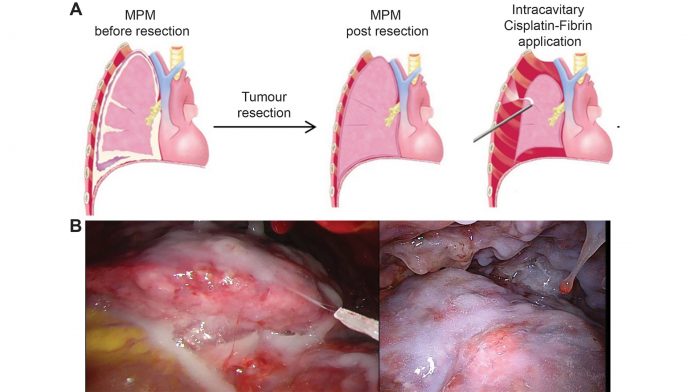Malignant mesothelioma of the pleura is an aggressive cancer affecting the lining of the lungs, primarily caused by asbestos exposure. It progresses rapidly and presents significant treatment challenges. Understanding its causes, symptoms, and treatment options is crucial for early diagnosis and improved patient outcomes.

Causes and Risk Factors
The primary cause of pleural mesothelioma is prolonged exposure to asbestos fibers, which, when inhaled, lodge in the pleura and cause inflammation and genetic damage over time. Other risk factors include:
- Occupational asbestos exposure (construction, shipbuilding, mining)
- Secondary exposure (family members of asbestos workers)
- Radiation exposure
- Genetic predisposition (BAP1 gene mutation)
Symptoms of Malignant Pleural Mesothelioma
Symptoms of pleural mesothelioma often appear decades after exposure and may include:
- Persistent chest pain
- Shortness of breath (dyspnea)
- Chronic cough
- Unexplained weight loss
- Pleural effusion (fluid buildup in the lungs)
- Fatigue
Diagnosis and Staging
Diagnostic Methods
Diagnosis of pleural mesothelioma involves imaging tests, biopsies, and laboratory analysis:
- Imaging Tests:
- Chest X-ray (detects pleural thickening, fluid accumulation)
- CT scan (identifies tumor location and extent)
- PET scan (distinguishes malignant from benign growths)
- Biopsy Procedures:
- Thoracoscopy (minimally invasive tissue sampling)
- Fine-needle aspiration (FNA) biopsy
- Histopathological Analysis:
- Epithelioid, sarcomatoid, or biphasic cell types confirmed via microscopy
Treatment Options for Malignant Pleural Mesothelioma
Surgery
- Extrapleural pneumonectomy (EPP): Removal of affected lung, pleura, diaphragm, and pericardium
- Pleurectomy/decortication (P/D): Lung-sparing surgery removing only the tumor-affected pleura
Chemotherapy
- First-line chemotherapy includes pemetrexed + cisplatin/carboplatin, which prolongs survival
- Immunotherapy (nivolumab, ipilimumab) is emerging as a promising approach
Radiation Therapy
- Used for palliative care to reduce pain and control tumor growth
- Applied post-surgery to prevent recurrence
Prognosis and Life Expectancy
The prognosis depends on stage at diagnosis, cell type, and patient health. Median survival rates:
- Stage 1: 20+ months
- Stage 2: 17-19 months
- Stage 3: 12-16 months
- Stage 4: 6-12 months
Prevention and Awareness
- Avoiding asbestos exposure is key to prevention
- Occupational safety regulations and routine screenings for at-risk individuals are essential
Malignant pleural mesothelioma remains a formidable disease with limited treatment options. Early diagnosis and multimodal therapy can improve survival rates. Ongoing research into targeted therapies and immunotherapy offers hope for better patient outcomes.

